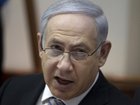Hezbollah chief Sayyed Hassan Nasrallah on Sunday announced that Hezbollah’s attack on Israel on Sunday morning had targeted an intelligence base just outside Tel Aviv and an air defense base in the heart of Israel.
“We targeted the Glilot military intelligence base near Tel Aviv, around 110 kilometers from Lebanon's border,” said Nasrallah in a speech dedicated to explaining Hezbollah’s response to the killing of its top military chief Fouad Shukur, who was assassinated in an airstrike on Beirut’s southern suburbs around a month ago.
 Full Story
Full Story
Israeli Prime Minister Benjamin Netanyahu warned that Sunday's strikes in Lebanon were "not the final word" in Israel's military campaign against Hezbollah.
 Full Story
Full Story
Israel has told foreign parties that it moved to thwart a major Hezbollah attack on Sunday morning and that it does not intend to “turn that into a broad war,” the Israel Hayom newspaper said.
 Full Story
Full Story
Beirut airport was functioning Sunday but many passengers were stuck as flights were cancelled or delayed, an AFP correspondent said, after Israel and Hezbollah announced broad strikes in an escalation of cross-border hostilities.
"We came at 4:30 am for our flight at 8:00 am but they told us it was cancelled," said Elham Shukair, a passenger headed to the United States via Jordan.
 Full Story
Full Story
Palestinian Islamist movement Hamas on Sunday hailed strikes by Lebanon's Hezbollah against Israel, calling it a "strong and focused response".
"We emphasize that this strong and focused response, which struck deep inside the Zionist entity, is a slap in the face" for the Israeli government, Hamas said in a statement after Hezbollah said it launched a large-scale operation using rockets and drones.
 Full Story
Full Story
On the deserted border between Lebanon and Israel, Spanish U.N. peacekeepers have for more than 10 months effectively been caught in a war zone.
Several Blue Helmets have been wounded in the crossfire between Israel and Lebanon's Hezbollah, which has also left dozens of Lebanese civilians dead in fallout from the Israeli war on Gaza.
 Full Story
Full Story
The United States said its commitment to Israel's defense was ironclad and that it was "postured" to support its ally after the Israeli military said Sunday it had launched strikes in Lebanon to prevent a major attack by Hezbollah.
U.S. Defense Secretary Lloyd Austin had spoken with Israeli counterpart Yoav Gallant about Israel's defense against attacks by the Iran-backed Lebanese militant group, Pentagon spokesman Major General Pat Ryder said.
 Full Story
Full Story
Hezbollah, which has exchanged fire with Israeli forces since October, last went to war with Israel in 2006 and has since expanded its domestic and regional influence, politically and militarily.
Financed and armed by Iran, Hezbollah is the most prominent actor in the so-called axis of resistance -- regional pro-Tehran armed groups opposed to Israel that also include Palestinian militants Hamas, Iraqi movements and Yemen's Houthi rebels.
 Full Story
Full Story
Caretaker prime minister Najib Mikati urged de-escalation Sunday after Israel struck Lebanon and Hezbollah said it launched attacks on Israeli positions, in a major escalation of cross-border hostilities.
Mikati on Sunday told ministers at an emergency meeting that he had been holding "a series of contacts with Lebanon's friends to stop the escalation".
 Full Story
Full Story
Israel and Hezbollah on Sunday launched their heaviest exchange of fire after months of strikes and counterstrikes, raising fears of an all-out war that could potentially draw in the United States, Iran and militant groups across the region.
By mid-morning, it appeared the exchange of fire had ended, with both sides saying they had only aimed at military targets. Lebanese authorities said the Israeli strikes killed three people, while there were no reports of casualties on the Israeli side. The situation remained tense.
 Full Story
Full Story



